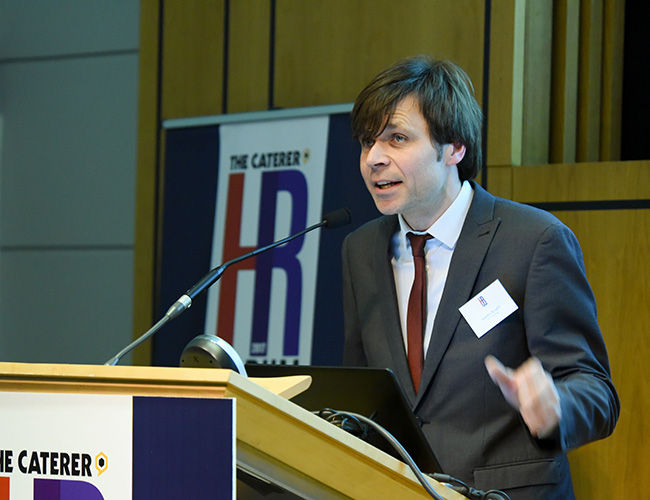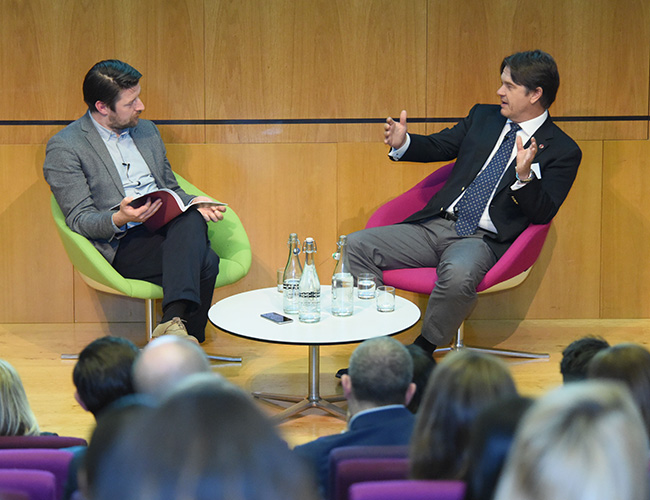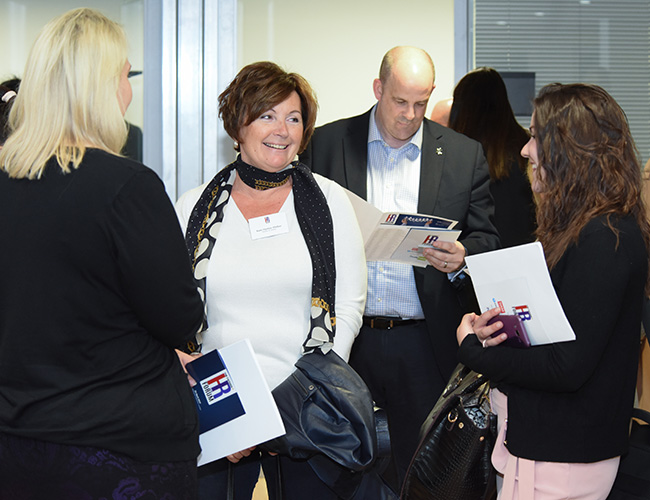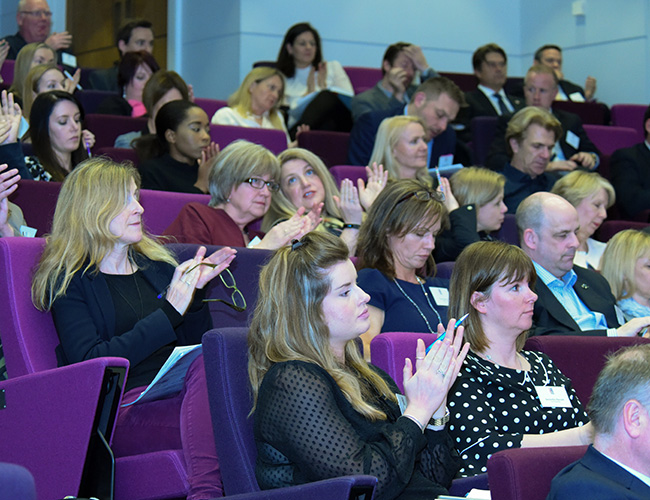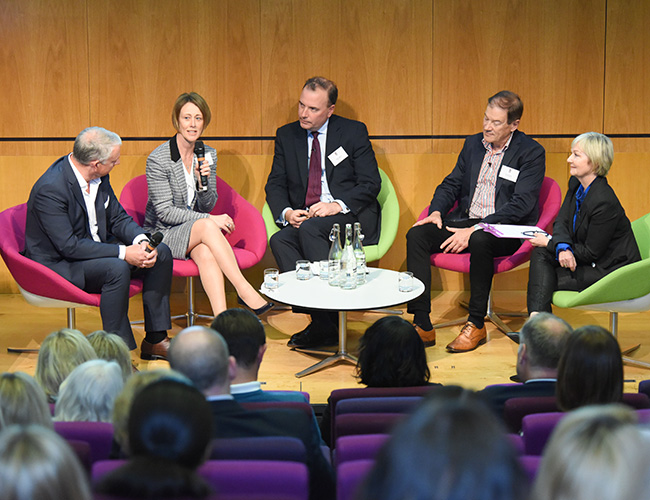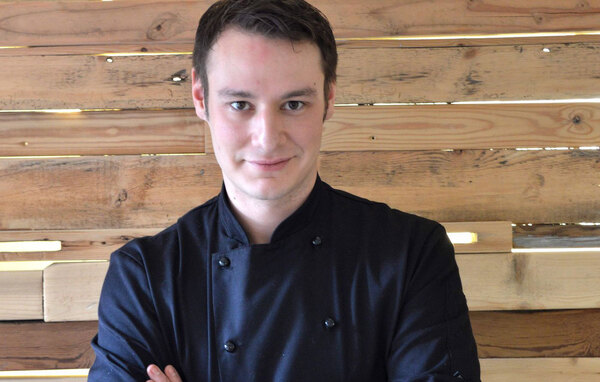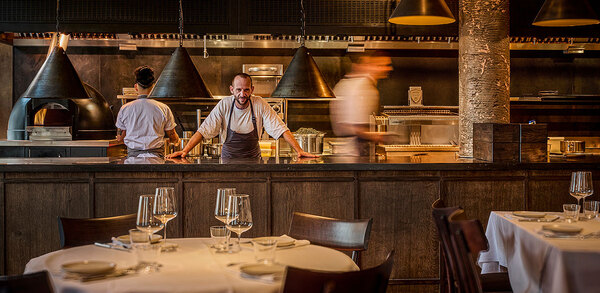The Caterer HR Forum 2017: power to the people
Inspirational speakers at *The Caterer'sRosalind Mullen* reports**
The latest HR Forum cracked open some of the toughest topics in hospitality. The wide-ranging agenda spanned talks on how to maximise the opportunities offered by the apprenticeship levy, to the importance of staff engagement and its impact on your bottom line, particularly in the light of Brexit.
Keynote speaker Julia Murrell, director of people and development at Firmdale Hotels, set the tone by sharing her successful engagement strategy. The group, which has eight hotels in London and two in New York, employs 1,500 people. Some 55% of guests are repeat and, last year, 7% of vacancies were filled by returning employees.
Murrell told the room that when she was brought on board two years ago with a remit to improve staff engagement, she started by asking employees why they worked at the company and what it could do better. âTwo things stood out,â said Murrell. âThey wanted more opportunities for learning and development and more feedback from managers.â
Her solution was to put HR âinto the businessâ by creating development managers to work directly in the hotels. She also implemented a âTalent Toolboxâ to improve feedback, set up reviews, manage career paths and measure engagement.
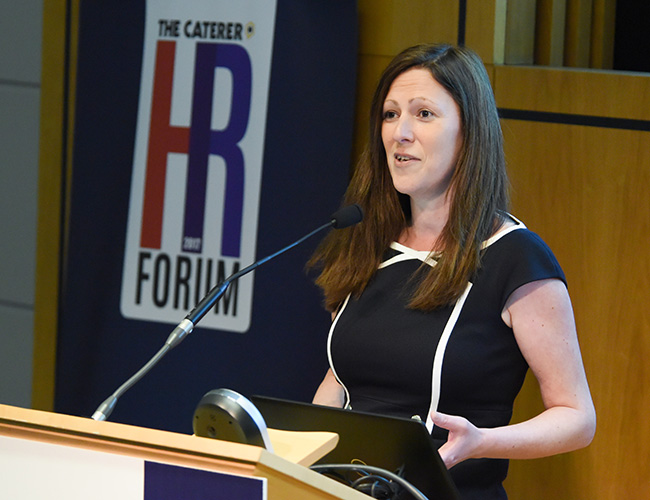
Murrell said: âYear one saw a 54% reduction in employer relations cases and a further 12% reduction in the second year. More than 80% of staff completed their annual review, compared with 15% in the previous year. We believe in our engagement strategy, with over 82% saying they love what they do.â
**Apprenticeship levy update
**Act now to maximise your levy funding and achieve the optimum return from your apprenticeship programme. That was the message from Martin Knight, sales director at HIT Training, and Tony Allen, special advisor on the apprenticeship levy and former director of the relationship team at the Skills Funding Agency.
Knight reminded everyone that the apprenticeship levy was coming into force that week and that companies with a £3m annual payroll will have to contribute 0.5% through PAYE. He added that the process of replacing existing frameworks with new apprenticeship standards and assessments will complete in 2020.
âItâs amazing how far apprenticeships have come,â said Knight.
Allen quashed any thoughts that a new government might rescind the levy: âIt brings in £3b a year and is supported by the major parties, he said. He described it as âa big dealâ, but also warned: âNon-payment penalties will be stringent, though there may be a period of grace in the first year.â
He urged companies to get organised, pointing out that unused levy funds will expire 24 months after they enter your account. To address this, some employers are already trying to âapprenticiseâ their learning and development programme so they can use their levy.
Allen flagged up that hospitality degree apprenticeships will be coming on-stream, supported by a university. These allow 18-year-olds to get a paid job while they study.
⢠Register online with the digital apprenticeship service
⢠Decide how you will use your levy â" will you recruit 16- to 18-year-olds, for instance?
⢠Find a good training provider
⢠If eligible, start to pay your levy now
Be aware that
⢠Education and training is a devolved policy, so the levy can only be used for employees in England
**Responsible employment
**Andrew Stephen, chief executive at the Sustainable Restaurant Association, was joined on stage by Peter Borg-Neal, founder and chief executive of Oakman Inns & Restaurants. They explored how forward-thinking companies are providing equal opportunities, training and clear policies to keep employees happy and productive.
âWhat we see is that how well a company treats its employees is a good predictor that they will score well in other areas, too,â said Stephen.
To outline the issue, he pointed out that although hospitality is the UKâs fourth-biggest employer, two-thirds of chefs are working more than 48 hours a week. In a recent survey, a quarter of those polled were ânetting out below the minimum wageâ he said, and added: âThe food scene is booming, but we need to do better.â
Borg-Neal told delegates that his business was benefiting from joining the SRAâs Fair Deal Campaign, which pledges fair pay, transparency around tips, training and sensible hours across the businessâs 17 sites and 540 staff. He argued that building a sustainable business with happy, engaged staff is crucial if you want to expand and thrive.
While both speakers supported the national living wage and minimum wage, they were concerned that some companies regard this as a limit rather than a base and that the issue is further confused by service charges.
âWe allow people to grow their salary by training them and adding to their skills,â said Borg-Neal. âA key principle is that people [in the industry are] underpaid and we should address this by giving them the education to do more for the business. If the good guys canât make profits, the bad guys win, so it has to be balanced with profits.â
Borg-Neal started his own career as a cellar boy, and urged: âWe need to get the message out that this industry is a meritocracy. If you work hard and have talent, there is nothing to stop you.â
Why you need to retain and reward staff in the wake of Brexit One of the grittiest issues of the day was tackled by Gautam Sahgal, chief operating officer at employee engagement company Perkbox. His message to those who were concerned about filling their skills gap after Brexit was clear.
âThis is a moment of discontinuity. How you react will determine whether you are a winner or loser,â he told delegates. âCompanies that put HR at the front and centre of their business will win.â
Sahgal outlined the figures, explaining that about 600,000 economic migrants arrive in the UK every year, though 300,000 leave. âThe UK unemployment rate is 4%, so there is demand for these people â" and hospitality is particularly reliant,â he said.
Underlining the potential effects of Brexit, he continued: âWhen migration goes down to 100,000 a year, it will create a discontinuity and the game will be about keeping people longer. The fact is, this should always be the game, because by engaging staff and slowing staff turnover, you will have more revenue and lower costs.â
Sahgal urged businesses â" particularly those with expansion plans â" to give HR departments a budget for people engagement. âIn a world where there is migrant shrink, how can growth continue? You need to hold on to employees,â he said.
With 94% of migrant workers concerned that they wonât meet visa requirements and 49% worried about job security, he said HR should:
⢠Understand what employeesâ worries are.
⢠Give reassurance.
⢠Identify unsettled employees.
⢠Offer guidance.
⢠Over-communicate on values and continue to hire staff.
As well as reducing recruitment and training costs, there are other benefits to retaining staff. Drawing on findings at Perkbox, Sahgal said the chance of an employee rising to manager level increases exponentially if they stay with a company for more than six months.
âWhatâs crucial will be the attrition rate. Higher tenure will mean higher revenue per head and lower costs per head,â he said.
With one in four workers now citing financial stress as something that affects their ability to do their job, and a third of adults wanting to improve their numeracy so they can better manage their finances, he urged delegates to support their employees with financial planning and money management.
âWe feel financial wellbeing is important, because if employees are happy and less stressed, they can concentrate on their jobs,â said Davidson. According to Dam, 73% of staff who receive education about pensions have said they feel more engaged with and positive about their employers.
He said a financial wellbeing programme might typically include mortgage clinics; annual review meetings; one-to-one meetings with advisers; advice on salaries; and reviews of the employee benefit scheme.
But when setting one up, Davidson warned: âEveryone has different financial situations, so one size does not fit all.â
He said consideration should be given to how the programme is delivered, as it will be affected by issues such as language and pay grades. Think about how often it is run, how it links into mortgages and pensions, and whether it can be tied into the launch of new benefits.
âWhy are you offering this to your people? What are you trying to address? It should not be a tick-box exercise. You need to look at how it can be designed to benefit the organisation,â said Davidson.
He cited one five-star hotel that started a financial advice programme, with the result that pension take-up increased by 50% in 12 months. Those over 50 realised they could think about retirement, mortgage clinics proved popular and the knock-on effect was that employee satisfaction ratings improved.
âThese are the things that will improve engagement and retain staff,â he said.
The apprenticeship levy
⢠Companies with an annual paybill of £3m or more must pay into the levy, at 0.5% of the paybill, paid monthly through PAYE.
⢠Employers in England who pay the levy and offer apprenticeship programmes will receive a monthly 10% top-up.
⢠Some 98% of employers have a paybill of less than £3m, so they will pay 10% of the cost of their apprenticeship programme to their training provider and the government will pay 90%.
⢠If you employ a 16- to 18-year-old apprentice, you will receive a bonus payment of £1,000. Those with fewer than 50 employees wonât have to make any contribution.
⢠The government will pay providers to train apprentices with added skill needs, such as minimum standard in English and maths. âIt is not from the levy pot, so there is no disincentive. It comes from the government,â says Tony Allen of the Skills Funding Agency.
The debate: taking on the challenges of 2017
Jane Sunley, founder and chief executive of Purple Cubed, took the chair in this lively debate on the key trends around people engagement in the coming year. In the panel were:
⢠Peter Banks, managing director, Rudding Park
⢠David Mills, director, CD Pubs
⢠James Horler, chief executive, 3Sixty Restaurant
⢠Moira Laird, human resources director, Valor Hospitality Partners and 2016 Best Employer Catey winner
ML We looked at department manager leadership scores on the Best Places to Work survey. Anyone who scored less than 80% was put on a two-day leadership development course. Of the 28 who went through it, 25 increased their engagement scores.
Can the rest of the panel give some examples of how you strive to engage staff?
JH We have 15 Ego Restaurants and 620 staff. Our general manager turnover is 7% and staff turnover is 16%. The GMs are our HR managers. That is their number one function. Itâs not just about the customer â" itâs about respect and attitude in the team. The only way you can have consistency of service is by having consistency in the team. We interview on personality and aptitude.
PB Rudding Park has £15m turnover and we have borrowed £9.5m, so the pressure is on for our 250 staff to perform. We recruit on attitude and I run a 90-minute induction for new staff. It is the most important thing I do. I make the culture clear and say that if staff are happy with mediocrity they should leave. It is important that it comes from me.
DM We are a family-run business with four pubs and we expand slowly. But you canât grow without people. We promote from within and encourage them to build up their teams so they can move up and we can expand.
What issues affect staff the most?
DM Tipping. In London, service charges are added, but it is unusual outside London. People are unsure how to tip and it creates an issue for the employer. If a service charge goes onto a card it is straightforward and the money is distributed among staff. If it comes in by cash it goes through the tronc system and that can be difficult to manage.
Any quick answers for the tip dilemma?
JH If you want to retain employees, you need to retain integrity. The idea of using it to offset the national living wage is wrong if you want to be a good employer â" and donât kid yourself they wonât see through it, because they will. Everyone should be fair to employees.
PB I am anti-service charge. I think we should scrap the whole thing and pay people properly.
Is it easier to attract staff inside or outside London?
PB It depends where you are. We are outside Harrogate and local recruitment is hard. Some 50% of staff are EU nationals and there are 23 different nationalities.
What are your views on Brexit?
PB Brexit isnât just a problem â" itâs a tsunami. We need to wake up and hang on to the staff weâve got. We have more than 30% labour turnover and I want to get this down. We need to have a feel of togetherness through induction, recruitment, training and looking after staff. It is the most important issue over the next two years.
How do you motivate executives to invest in HR?
ML It has got to be ingrained in the business. I work in an employee-centric business, so I have support. Engagement is not a new thing, itâs about improving the industry as a place to work.
JH Restaurants need to grow like-for-like sales by 4% to get through, and so they need to keep their staff. If you are constantly replacing and training staff to do the basics, you will only ever see your profits go backwards. The best way to get 4% in sales is to have employees who are engaged and know how to up-sell that bottle of wine.
DM It is important that employees are efficient and that when a customer comes into the pub they know the staff behind the bar. Repeat business is what it is about.
Generation Y and Z must be pushing improvement?
JH Itâs true. Twenty years ago, work-life balance was not important, but it is now. We need rotas that are well-planned in advance and we donât want people working more than 40 hours a week.
ML They also want change. They want to work in more than one department. And now, if they resign, we are having conversations with them about attracting them back again when they are ready for their next move.
How can we engender a culture where they want to work in hospitality?
DM A waiter in France sees it as a career. Here, waiters think: âIâll do this before I get a proper jobâ. We send people on courses. They need a career path and, if they can see a route, they are happy to work with us.
PB We need to demonstrate to the parents that it is a good career. And donât make them work every Saturday night. Give them decent pay, decent holidays and make it a better place to work.
ML And itâs not just about being a chef and a waitress. There are lots of specialisms in the industry now â" HR, finance, and so on.
Top tips on engaging staff
⢠Deal with people with integrity and respect. Get that into your DNA.
⢠Keep incentives simple, short, sweet and repeat.
⢠Love your staff and never let them down. Without them you are dead.
⢠Treat your staff like a family. Correct them when they are wrong and help them when they need it.
Best Places to Work
A high point of the day was the unveiling of the 30 Best Places to Work in Hospitality 2017, compiled by The Caterer and employee engagement expert Purple Cubed.
Jo Harley, managing director at Purple Cubed, took to the stage to explain how taking part in the Best Places survey can motivate employees. Last yearâs Best Employer Catey winner, Valor, saw staff turnover drop by 7% and 30,000 more people search for jobs online.
This year, some 100 companies entered, with feedback from 10,000 employees giving a unique snapshot of morale in the industry. The employees first prioritise what makes a business a great place to work and then they rate their employer against it. The priorities were:
⢠Team respect
⢠Working together to produce good results
⢠Work-life balance
⢠Being paid on time
⢠Communication
Other outcomes from the survey revealed that 62% of employees were proud to work for their company, 49% felt they were treated well, but 13% were actively disengaged.
Urging the industry to address engagement, Harley told delegates that it starts with culture and leadership: âWe know engaged employees are more attuned to customers and that can result in 21% greater profitability. So really itâs a no-brainer,â she said.



